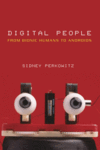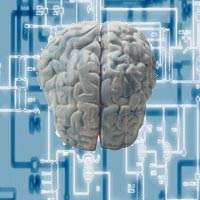May 16, 2004
'Digital People': The Humanoid Condition
By DICK TERESI
Book Review of:

DIGITAL PEOPLE
From Bionic Humans to Androids.
By Sidney Perkowitz. 238 pp. Washington: Joseph Henry Press. $24.95.
ROBOTICIST friend was perplexed. For the benefit of children living in apartments in which pets are prohibited, he built robot puppies that ''do everything a dog does.'' Yet, somehow, kids in focus groups shunned the robo-pups. ''Perhaps,'' I offered, ''it's because they are not alive.'' He considered this for a moment. ''No, that wouldn't be it,'' he said.
I find it maddening to talk to roboticists. One must avoid nuance, figurative speech and, above all, humor. Their limited awareness is their downfall and their strength. The biologist makes no distinction between human and nonhuman life-forms. The roboticist takes this a step further, refusing to distinguish between living and nonliving objects. An object is the sum of its behaviors. Duplicate the behavior of a person and your robot is human. Out of this obtuse worldview come simplicity and the singleness of purpose required to build metal-and-silicon men.
Sidney Perkowitz, a physicist at Emory University and a writer of popular science, captures this view in ''Digital People: From Bionic Humans to Androids.'' The robots he's interested in are not industrial types that weld your car's chassis, but androids that mimic humans or parts of them. He asks, ''Can machines live?'' His answer is, I think, yes: ''It won't be long before we all number synthetic creatures among our friends.'' He forgets that many of us are still struggling with multiculturalism.
READ BOOK ONLINE: http://www.nap.edu/b...309089875/html/
Quote from page 6:
The desire to make ourselves healthier and more beautiful is rooted in our strongest motivation to consider artificial beings: fear of death. It is extreme fantasy, perhaps, to think that artificial creations might allow individuals or the entire race to foil nature and achieve immortality; but it is no fantasy to say that as we develop such beings, we begin scientifically exploring the incomprehensible gap between the living and dead, the animate and inanimate. Inevitably, even cautious forays into this territory carry a scent of hubris, in the belief that we can outdo evolutionary forces or perhaps God Himself.
http://www.nap.edu/n...y&file=1-14.htm












































